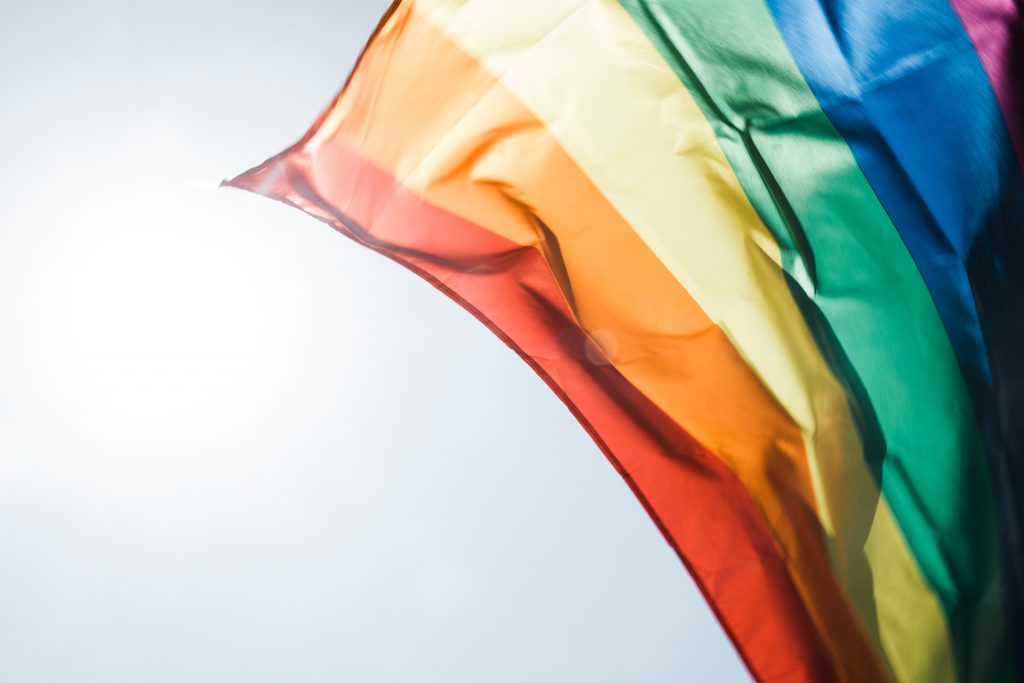Mark Tricklebank is a Wellcome Trust Career Re-entry Fellow in the Department of Neuroimaging Sciences. He is a committee member for Proudly King’s. For LGBTQ+ History Month, he writes about his experiences of coming to terms with his sexuality and finding a career at King’s as a gay man with a disability.
 The greatest achievement for the LGBTQ movement has undoubtedly been the decriminalisation of sexual relations between consenting adults. As a young boy enrolled at a Church of England school, trying to come to terms with same-sex attraction, the path to damnation was clear enough. The glint of golden hairs on the suntanned arm of a classmate was part of dangerous dreams that would only introduce me to the word “pervert”. Those were the times then.
The greatest achievement for the LGBTQ movement has undoubtedly been the decriminalisation of sexual relations between consenting adults. As a young boy enrolled at a Church of England school, trying to come to terms with same-sex attraction, the path to damnation was clear enough. The glint of golden hairs on the suntanned arm of a classmate was part of dangerous dreams that would only introduce me to the word “pervert”. Those were the times then.
Yes, things have changed so much for the better. Today we can just say, “so what I’m gay, just get over it”. In my past, I didn’t have that privilege. I hid myself, found a girlfriend and got married. My lack of self-understanding pushed me towards a career in Psychology: I wanted to know what made people do what they do. I was always torn between Psychology and Biochemistry and with not very good A levels I was determined to get a university degree and become a qualified scientist – but scientists weren’t gay, how could I? My girlfriend was the perfect cover, and I could pretend I wasn’t gay.
University, family and carrying on
I left my Black Country home for a BSc joint honours at the Westham College of Technology in Psychology and Biochemistry in London. I won a Desmond Tutu award not high enough for a PhD scholarship but was delighted to learn that the Institute of Psychiatry was offering a master’s course in Neurochemistry for which my qualifications were accepted. By this time, I was married and locked the closet door firmly shut, and promised to myself to be a good husband and successful scientist. I enrolled for a PhD in Manchester. During this time I also became a father, and my child gave me true meaning in life. I vowed to suppress all unwanted desires and devote myself to my family. I was a very good father – but also kept the closet door firmly shut. I kept quiet, calm and carried on.
Career steps across Europe and Coming out
After obtaining my PhD I returned to London as a Postdoc at the Institute of Neurology, now with a daughter and a son! I didn’t like myself very much, not for being closeted, but for the deceitful guilt that still rattles and impedes my life on a daily basis. Jobs were in short supply and we had just joined the European Economic Community in the mid-70s – and so I joined the pharmaceutical industry and moved to Strasbourg. Like in London and Manchester, gay life was there in cosy cafes and clubs, but I kept away, terrified of losing my job and my family, and especially my children who I feared would be taken into care.
While working in Switzerland my wife left me. After this, I decided to put on a brave face and come out to my children and my employer. What I learned from this was that people were amazingly sympathetic; attitudes were changing fast. My children were fine as they were charting their own path. They were saddened but not angry, understanding even. And my work colleagues? I suddenly found I had been working with many gay colleagues, none of whom suspected I was just like them. I felt liberated and deliriously happy at last. I was out and proud, glad to be gay as the song went.
Managing a disability and joining King’s
Later on, I moved back to England to a workplace priding itself on its inclusion and diversity ideals. Then disaster struck, and I had a serious stroke which left me hemiplegic. I lost my job because of my stroke. To continue working in science, I was given hope by a former collaborator at King’s. They informed me of the Wellcome Trust Career Re-entry Fellowship scheme, to which I applied, and won. I could continue my career thanks to the sympathy and compassion of my departmental colleagues.
At King’s Careers & Employability, you can find support for managing your career planning with a disability including longer advice appointments, exclusive Internship programmes and lots of advice resources on KEATS.
Proud moments at King’s
Fastening my King’s ID to a rainbow lanyard was one of the proudest moments of my life, as was ticking the gay box on the human resources joining form. I was even more delighted when I saw so many staff and students wearing rainbow lanyards. The Dean of my faculty was openly gay. I felt I had arrived at my true destination back to where my miserable first degree had been uplifted by my Masters in Neurochemistry and nobody had the slightest concern about my sexual orientation. With this, I felt it my duty to become actively involved in Proudly King’s as a committee member.
My advice to gay students at King’s, who are hoping to enter a career in science but unsure whether to be open, is this. You will find your most optimistic view of society expressed at King’s on a daily basis. People are tolerant, compassionate, charitable and most of all care about you as an individual. You can be that individual here without fear.
Interested in building connections and growing your network at KCL? Proudly King’s is a LGBTQ+ network open for everyone in the King’s community. Why not explore exciting events and talks as part of LGBTQ+ History Month – and all year round!
